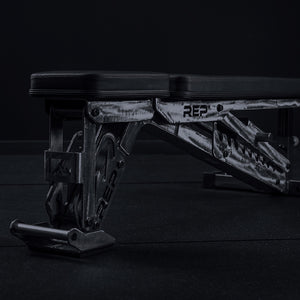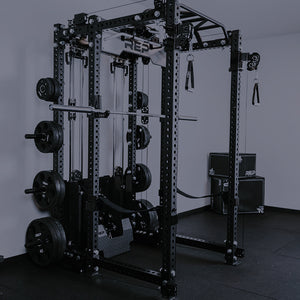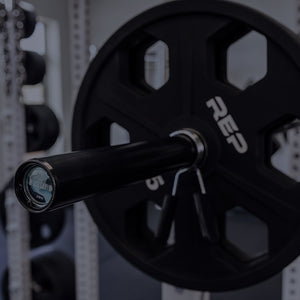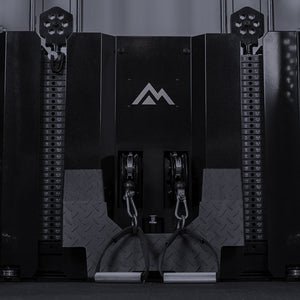
All weight plates are not for all lifters. The perfect style for you depends on your individual goals.
A typical recreational lifter might not care. And if you’re just starting out or on a budget, any plates are better than no plates.
But if you want to make an informed decision, here’s a look at how REP’s weight plates differ in terms of material, weight tolerance, size, and other features, and how to pick the right style for your home or commercial gym.
The Different Types of Weight Plates
There are several types of weight plates:
Iron plates
Iron plates are just what they sound like: the hard, iron weight plates that make clanking noises and that satisfying, sharp, sliding sound when you load them onto your barbell. Iron plates are those classic, old-school circles. They’re usually silver or black. There are different types of iron plates.
Calibrated Plates

Calibrated plates tend to be thinner and have tighter tolerances than other types of plates. This allows more plates to be loaded onto a bar. However, what's most important about these plates is that the weight that's marked is the weight you're getting (many standard iron plates and bumper plates can say one thing but actually be a pound or more off). This type of accuracy is important for powerlifters and anyone working with heavy weights.
REP offers Calibrated Steel Plates in pounds and kilograms.
Bumper Plates
Bumpers are rubber-coated plates that can be black but are also frequently multi-colored. These typically have a steel core surrounded by a thick, high-density, rubber coating (not to be confused with the thin coating you may find on irons to protect them from scratches). You can find a variety of fun bumpers of different colors, patterns, and styles. Plus, for the most durable choice, opt for the low-bounce Sport Bumper Plates, with a 3% tolerance.
Learn more about the difference between iron plates and bumper plates here.
Fractional/Change Plates
Change Plates and Fractional Plates (also called micro plates) are lightweight plates to add to your barbell for tiny jumps. For bigger, compound lifts like deadlift, the smaller Fractional Plates may not always be useful, but the ability to make a wee jump on upper body lifts -- like bench press, barbell curls, power cleans, or overhead press -- can make a huge difference.
Learn more about the difference between fractional plates and change plates here.
A Look at the Different Kinds of Weight Plates
Here's a closer look at the different kinds of weight plates, comparing their material, weight range, benefit, weight tolerance (that's how accurate the weight is; a lower tolerance is more accurate), and other distinguishing features.



Pick Your Plates
Material: Iron with matte finish
Weight Range: 2.5-45lbs
Benefit: Cost effective, classic
Tolerance: 3%
Other Features: Marked in both lbs and kgs; lip for maneuverability
USA-Made Equalizer ® iron plates
Material: Cast iron finished with premium metallic black E-coat
Weight Range: 2.5-45lbs
Benefit: Highest-quality, cast-iron Olympic plates, made in USA, symmetrical grip holes
Tolerance: 2%
Other features: Attention to detail, machine-drilled center hole for tight fit
Material: Iron with rubber coating
Weight Range: 2.5-45lbs
Benefit: Coating adds protection
Tolerance: 3%
Other Features: Grip holes, attractive details
 Urethane-coated Equalizer ® plates
Urethane-coated Equalizer ® plates
Material: Iron with commercial-grade urethane coating
Weight Range: 2.5-45lbs
Benefit: Premium, ultra durable
Tolerance: 3%
Other Features: Grip holes, high-end finishes
Material: Rubber coating with steel inserts
Weight Range: 10-45lbs or 5-20kg
Benefit: Low bounce, durable, low tolerance (high accuracy)
Tolerance: 1%
Other Features: Extra thick 10lb plates to reduce bending
Material: Rubber coating with weighted steel center
Weight Range: 10-55lbs or 5-25kg
Benefit: Colored per IWF standards, low tolerance
Tolerance: 1%
Other Features: Extra thick 10lb/5kg plates to reduce bending and thinner 45lb/20kg to fit more on bar
Material: Rubber coating with hooked steel insert
Weight Range: 10-55lbs
Benefit: Animal print pattern, aesthetic, low tolerance
Tolerance: 1%
Other Features: Extra thick 10lb plate to reduce bending, low bounce
Competition Bumper Plates (LB/KG)
Material: Rubber coating with zinc-coated steel disc insert
Weight Range: 25-55lbs or 10-25kg
Benefit: Top tier, most accurate tolerance, extra inner steel ring
Tolerance: 0.25%
Other Features: Color coded per IWF standards
 Pinnacle ™ plates
Pinnacle ™ plates
Material: Crumb rubber with steel insert
Weight Range: 10-55lbs
Benefit: Softer bounce, extra durable
Tolerance: 1%
Other Features: Color-coded fleck with aesthetic mountain design
Material: Hard plastic
Weight Range: 5lb or 2.5kg
Benefit: Light weight but same diameter as regular bumpers
Tolerance: 3%
Other Features: Black weight markings
Material: Recycled, vulcanized rubber with stainless-steel insert
Weight Range: 5-45lbs
Benefit: Environmentally friendly, made in USA
Other Features: Stronger than traditional rubber
Material: Rubber coating with steel inserts
Weight Range: 10-55lbs
Benefit: Quieter than standard bumpers
Tolerance: 3%
Other Features: Textured edges, IWF color, low bounce
Material: Steel with powder coating
Weight Range: 0.25-1lb or 0.25-1kg
Benefit: Allow small weight jumps
Tolerance: 3%
Other Features: Color coded, laser-engraved markings
Material: Rubber coating with metal insert
Weight Range: 1.25-10lbs or 0.5-5kg
Benefit: Allow small weight jumps with high accuracy
Tolerance: 1%
Other Features: Color coded with raised markings
What Are the Different Sizes of Weight Plates?
Weight plates come in various sizes, allowing lifters to customize their barbell weight for different exercises. The most common plate weights include:
Standard Plates – 2.5lb, 5lb, 10lb, 25lb, 35lb, and 45lb
Bumper Plates – Same weight options but made of rubber for Olympic lifting
Fractional Plates – Smaller increments like 1.25lb and 2.5lb for progressive overload
How Much Is One Plate?
In most gyms, when people refer to "one plate," they mean a 45lb plate on each side of a standard Olympic barbell (which itself weighs 45lbs). This brings the total weight to 135lbs.
How Much Is 2 45-Plates on Each Side?
With two 45lb plates per side, the calculation is:
(45 × 2 × 2) + 45 = 225lbs
How Much Is 3 Plates on Each Side?
If you load three 45lb plates on each side, the total weight, including the bar, is:
(45 × 3 × 2) + 45 = 315lbs
To calculate barbell weight quickly, a barbell calculator can help determine the exact load based on your plates and bar type. Whether you're lifting for strength or endurance, understanding weight plate sizes ensures you train effectively.
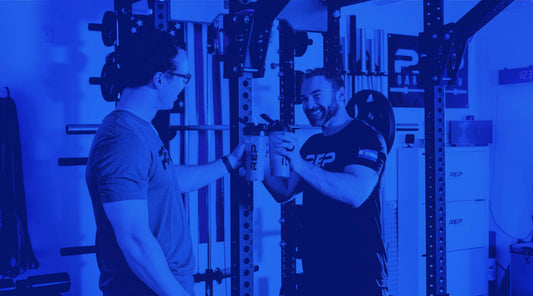
NEWSLETTER SIGNUP
Product launch information, promotions, blogs, and REP news.

